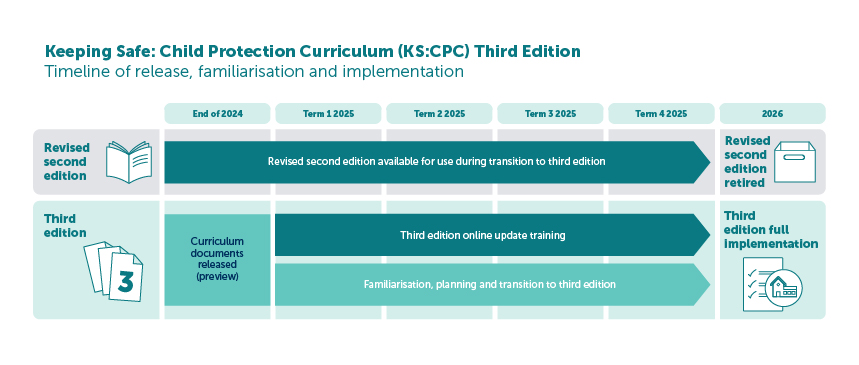On this page
The Keeping Safe: Child Protection Curriculum (KS:CPC) is a child safety and respectful relationships curriculum for children and young people from age birth to year 12.
The KS:CPC provides age and developmentally appropriate strategies to help children and young people keep themselves safe. It has gained a world leading reputation due to its depth of content, breadth of learning, contemporary nature, and the requirement for explicit training.
KS:CPC third edition is available
Staff trained in delivering the KS:CPC can access the third edition from the KS:CPC website.
This is the timeline of release and implementation schedule.

Educator responsibilities
The KS:CPC is mandated in all Department for Education preschools and schools for children and young people from age 3 to year 12.
The department has a legal obligation to safeguard children and young people. The safeguarding children and young people policy (PDF 818KB) outlines that:
- all children and young people in department preschools and schools will access the KS:CPC each year
- the KS:CPC is taught by educators who are trained in its use.
Staff must complete the full day educator course before delivering the KS:CPC to children and young people.
Access your KS:CPC training data
As a department site leader, you can access staff training data on the HR management information system (staff login required).
The KS:CPC training data HRS help sheet (PDF 238KB) has more instructions.
As a staff member, you can check your training status on the employee information kiosk (EIK) (staff login required) or by contacting education.cpc@sa.gov.au.
Full day KS:CPC training – upcoming courses
Training is available in metropolitan and regional locations, or it can be delivered at your school or preschool.
You can view upcoming metropolitan and regional courses on the KS:CPC website.
On-site training at your school or preschool
To enquire about training at your preschool or school email education.cpc@sa.gov.au.
Online update course
The third edition online update course will be available early 2025 for staff that have completed the full day training. We strongly encourage you to complete the update course on the KS:CPC website (KS:CPC login required).
Documents and resources available after training
Once you have completed the KS:CPC full day face-to-face training, you can access the documents and resources.
The KS:CPC documents are available for download as PDFs from the KS:CPC website (KS:CPC login required).
Implementing the KS:CPC
Preschool implementation
The KS:CPC concepts and activities can be integrated within the preschool program and connected with the Early Years Learning Framework.
School implementation
The KS:CPC content can be aligned to Australian Curriculum learning areas and some SACE subjects; however, activities may need to be adapted to ensure the learning intentions of both are met. Opportunities can be identified to incorporate and/or support the knowledge, skills and understanding of the KS:CPC across all learning areas and through the general capabilities and cross-curriculum priorities.
Refer to the KS:CPC curriculum mapping tools (KS:CPC login required).
Whole site planning
Resources are available to support KS:CPC planning and implementation (KS:CPC login required) such as the site implementation rubric, whole site implementation guide and the sample planning guides.
Communicating with parents and carers
Although parent or carer permission is not required for children to participate in the Keeping Safe: Child Protection Curriculum under the Education and Children's Services Act 2019 (SA), preschools and schools should keep parents or carers informed and encourage them to ask for more information if they need it.
You can find a range of KS:CPC parent and carer resources (KS:CPC login required) to support communication. Parents and carers can access the Keeping Safe: Child Protection Curriculum information for parents and carers for information and resources.
Access to the KS:CPC for other organisations
The Keeping Safe: Child Protection Curriculum is used in some other sectors and schools nationally and internationally. The Department for Education retains the intellectual property of the KS:CPC to make sure the curriculum stays up-to-date and maintains its high profile and integrity. For more information about licence agreements and accessing the KS:CPC refer to accessing the KS:CPC website or email education.cpc@sa.gov.au.
Consent and respectful relationships and consent education
Consent and respectful relationships and consent education are addressed through the Australian Curriculum and the KS:CPC.
Australian Curriculum
Respectful relationships and consent are primarily addressed through the health and physical education learning area and within the ‘relationships and sexuality’ and ‘safety’ focus areas. This includes content about negotiating consent, managing relationships online and offline, and dealing with relationships when there is an imbalance of power. Consent is also addressed within digital technology and in particular social media.
The curriculum connections show how content from across the Australian Curriculum learning areas and general capabilities can be organised to deliver respectful relationships and consent education.
KS:CPC
Learning about respectful relationships is at the foundation of the KS:CPC for children and young people from early to secondary years. Concepts focussing on consent are embedded throughout the curriculum at an age and developmentally appropriate level. This includes:
- healthy and unhealthy relationships
- rights and responsibilities in relationships
- power in relationships
- bodily integrity
- personal space and boundaries
- consent and sexual consent
- safe, unsafe and unwanted touch
- online safety
- physical, emotional and sexual abuse, and neglect
- domestic and family violence, coercive control, gender-based violence
- online safety
- recognising and reporting abuse
- trusted networks and support services.


